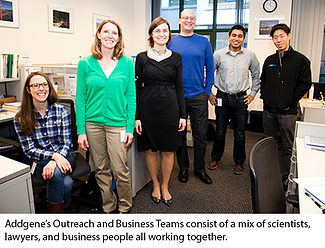 I sold out, well in part that’s what leaving academia feels like for a lot of researchers. For many years I struggled with the questions of “Will I leave academia?” and "What type of science careers would would make a good fit for me?" Whatever would I do next and what options lie ahead of me? Like a considerable number of researchers, I had high hopes of securing tenure in a British or Irish University where I would continue on with my academic dream of studying cell division. However, after 6 years in the business of western blots and cloning, I decided to pack it in. I had just started month 8 of my 3 year Post-Doctoral contract at the University of Cambridge and knew it was time to leave. I really enjoyed my time in the lab, my colleagues and what I was researching, but I decided I needed a new challenge.
I sold out, well in part that’s what leaving academia feels like for a lot of researchers. For many years I struggled with the questions of “Will I leave academia?” and "What type of science careers would would make a good fit for me?" Whatever would I do next and what options lie ahead of me? Like a considerable number of researchers, I had high hopes of securing tenure in a British or Irish University where I would continue on with my academic dream of studying cell division. However, after 6 years in the business of western blots and cloning, I decided to pack it in. I had just started month 8 of my 3 year Post-Doctoral contract at the University of Cambridge and knew it was time to leave. I really enjoyed my time in the lab, my colleagues and what I was researching, but I decided I needed a new challenge.
Looking for sales and marketing jobs
Like most choices we make, my job choices were mostly by chance. Luckily, around the time I decided to look for work outside of academia, a job as a ‘Cancer Marketing Coordinator’ came up at Abcam. Unlike other job descriptions for marketing positions posted on recruitment websites, this job specifically looked for a researcher with 3 years+ of cancer research experience, a PhD or a Master’s degree and some marketing experience, with little emphasis placed on the marketing or business background of the applicant. However, although this position did look for an academic candidate, I knew they would look for a candidate with extra experience or a marketing interest that would be able to apply themselves immediately to the position.
In case you are interested yourself, sales and marketing positions like these are widely available, especially for life science researchers. Many biotechnology companies are looking for PhD or Master’s level scientists who have knowledge of their product portfolio. After all, you have been their target market for many years and purchased their products, so you have some of the best ideas on how to sell these products to other scientists.
Tailoring my CV for the job
To become an attractive candidate I knew I had to push not only my academic background but also my business acumen and sales experience. Most scientists think that they are unable to tick these final two boxes, but I knew there would be a way around this. First off I tore up my “Scientific CV” and wrote a more business friendly CV that would focus on my achievements, capabilities, courses and office skills. I removed my techniques and protocols, courses taken during my PhD and Undergraduate sections and brought in more focus on the list of conferences I presented at and placed them under headlines entitled “Presentation Experience”, “Career Achievements”, and “Academic Achievements”. Leaning my CV more towards me as a product and not me as a scientist. Second, I updated my LinkedIn profile, matched it with my CV and added more business-like elements. At this point you may be asking yourself, "Why would you switch the focus of your CV from science-focused to business-focused?" The reason is that I knew that the mind-set of the employer was not such that he/she would be looking at where I had published, who I had published with and whether I would be able to carry out a yeast-2-hybrid library screen; instead I thought they would focus on “Has this person been consistent throughout their career?”, "Have they sought out opportunities to expand their skill sets?", “Have they succeeded in what they have done?” and “Would their academic experience compliment this sales and marketing role?”.
Studying for interviews
Studying for interviews is really important. For my Postdoc position, I tried to read at least 50 papers on the topic before I went for the interview. So reading for my current sales position interview was just as important. The problem was I knew I had a knowledge gap. I had no previous business, marketing or sales training and knew I had to start somewhere. I knew if I started with the Harvard Business Review or some Chartered Institute of Marketing reviews, I would have struggled. Furthermore I would not have covered as much of the basics of sales and marketing and reading some of these articles would have stressed me out more than necessary for my interview. The simplest place I could think of to start was “Marketing for Dummies”. The fastest way to learn something about marketing would be to start reading a broad simple overview, learn some jargon and key phrases and understand enough to relate it to the position I was applying for. After all I was only going to be interviewed for 1 hour so having a broad enough insight was going to help me push both my scientific and marketing knowledge.
For most PhDs looking at careers outside of academia, sales and marketing can be great places to start. Depending on what type of career you would like to build, sales and marketing gives you a great introduction to the financial world. It teaches you about selling products which is an important part of the business and allows you to work with and alongside the customer. From there a move with either promotions or further education may allow you to transition into various realms of business.
Thank you to our guest blogger!
 Seán was a PhD student at University College Dublin & a post-doc a Cambridge University where he studied mechanisms of cell division. Recently Seán got the entrepreneurial bug and has set up an ELISA kit company on whose website you can find some great information on ELISA troubleshooting, ELISA kits and cell death assays. You can find Seán on twitter @Macfhearraigh.
Seán was a PhD student at University College Dublin & a post-doc a Cambridge University where he studied mechanisms of cell division. Recently Seán got the entrepreneurial bug and has set up an ELISA kit company on whose website you can find some great information on ELISA troubleshooting, ELISA kits and cell death assays. You can find Seán on twitter @Macfhearraigh.
Read more posts about Scientific Career Development
Topics: Science Careers, Applying for Jobs, Science Career Options






Leave a Comment